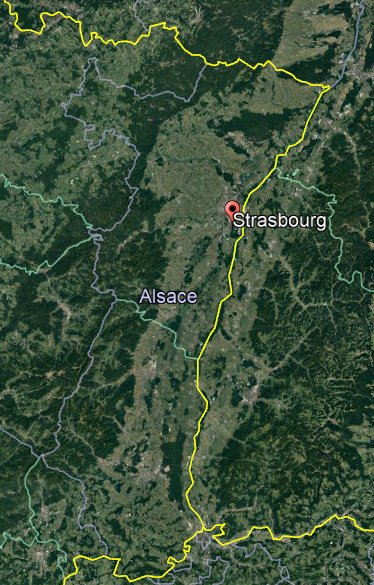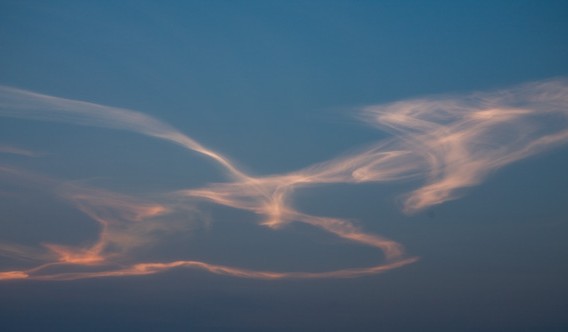ALSACAT-1276-00-00-STRASBOURG-1
Meteorologist Henri Bardy en 1866, and columnist Charles Grad in 1870, noted that above the city of Strasbourg, a red cloud or halo that turned into a cross had appeared after Palm Sunday in 1276.
These authors were referring to the chronicles of the Dominican monks of Colmar, written between 1294 and 1296.
| Date: | 1276 |
|---|---|
| Time: | ? |
| Duration: | ? |
| First known report date: | 1870 |
| Reporting delay: | 4 centuries. |
| Department: | Bas-Rhin |
|---|---|
| City: | Strasbourg |
| Place: | Above the city of Strasbourg. |
| Latitude: | 48.581 |
| Longitude: | 7.747 |
| Uncertainty radius: | 10 km |
| Number of alleged witnesses: | ? |
|---|---|
| Number of known witnesses: | 0 |
| Number of named witnesses: | 0 |
| Witness(es) ages: | ? |
| Witness(es) types: | ? |
| Reporting channel: | Contemporary local chronicle. |
|---|---|
| Type of location: | Above a city. |
| Visibility conditions: | ? |
| UFO observed: | Yes |
| UFO arrival observed: | ? |
| UFO departure observed: | ? |
| Entities: | No |
| Photographs: | No. |
| Sketch(s) by witness(es): | No. |
| Sketch(es) approved by witness(es): | No. |
| Witness(es) feelings: | ? |
| Witnesses interpretation: | ? |
| Hynek: | ? |
|---|---|
| ALSACAT: | Probable aurora or noctilucent clouds. |
[Ref. hby1:] HENRI BARDY:

|
The following facts are recorded in the Annales des Dominicains de Colmar, a work from the 13th century which constitutes one of the important monuments in the history of Germany in the Middle Ages, and which is, without a doubt, the capital document of the history of Alsace during the period to which it refers (1211 - 1308).
These notes are given according to the excellent edition of the royal library of Stuttgart, by Messrs. Gérard, lawyer at the imperial court of Colmar, and Liblin, director of the Revue d'Alsace (Colmar, 1854).
[...]
1276. -- [...]
A red cloud appeared above the city of Strasbourg which turned into a cross after Palm Sunday. The previous year, around Easter, one had similarly seen, near the sun, two circles having the color of the rainbow, which were interrupted and seemed to form two crosses.
[Ref. cgd1:] CHARLES GRAD:
1276. --
[...]
A red halo appeared above the city of Strasbourg, it changed to a cross, after Palm Sunday.
[...]

|
I am personally not very keen on calling "UFO" this sort of things that can be found in ancient chronicles.
But many ufologists reported such things, usually with the idea of showing that aerial phenomena that may have qualified as UFOs exist since "time immemorial", not just since the beginning of a "flying saucer hype".
That's why I noted down that phenomenon, especially as a trivial explanation seems to me less obvious than many other ancient stories of this kind, quickly called "UFO of the past."
Indeed, I do not see a known natural phenomenon that turns a red cloud into a cross, except perhaps to consider that it was some noctilucent cloud or clouds that would have taken the form of a cross. With the religious event in progress, it's pretty obvious that it had to strike the people's minds. Noctilucent clouds are much more orange than red, but the religious context could have altered the description.

|
Above: it is more common these days to find noctilucent clouds tinted in orange by the setting sun and with linear forms, or crossing each other. This example is actually of traces left by a Space Shuttle launch.
Here is something I found in the compilation "La Presse", volume 1836-1952, available at the National Library of France in Paris [lpe1]:
Day of April 7, [1870]. Maximum temperature in the shade, 19°,1 (between 1 pm and the evening); Minimum temperature, ditto; 5°,9 (between 6 am and 7 am.) Average temperature, dito, 12°,5; maximum temperature in the sun, 50°6 (between 1 pm and 4 pm in the evening.); rain 0 mm. The aurora borealis that, Saturday night, appeared the horizon, and of which people in the West and the East benefitted of the magnificent spectacle, made for a hard time of concern among many residents. Here what is written in the Courrier du Bas Rhin, of Barr, on April 6.
"Great excitement in our city yesterday at nine pm. One came in crowds places where one could freely observe the sky to the north;. A bright red hue totally similar to that of a fire could be seen in that direction."
"With their usual promptness, our firefighters took their uniforms, preparing the fire pump for outside help and were preparing to leave at the first alert. "The fire is in Heiligenstein!" said one; the fact was denied at once by people who came from there. "It burns in Saint-Nabor, in Ottrott, in the Urlossenholz forest!" shouted others; the hill of Heiligenstein prevented to check immediately. There was still talks, when finally it was recognized that instead of a great fire, one had before his eyes a brilliant aurora borealis!"
"PS At the time of closing this letter, I learn by the bus driver who came last night from Schlestadt [Sélestat] that thousands of people of this city came to the ramparts to watch the fire. The same observation made all the population of the villages along the mountain stand up. Deceived by the glow, firemen in Obernai allegedly hasted to Rosheim, while perhaps the firemen of that city went to Molsheim."
In Dambach, people had the same fears. They saw in the northern lights for a few minutes, only the reflections of a huge fire.
Of course, the "date is wrong"; however, it reminded me that the sighting may of have an aurora also.
Probable aurora or noctilucent clouds.
* = Source is available to me.
? = Source I am told about but could not get so far. Help needed.
| Main author: | Patrick Gross |
|---|---|
| Contributors: | None |
| Reviewers: | None |
| Editor: | Patrick Gross |
| Version: | Create/changed by: | Date: | Description: |
|---|---|---|---|
| 0.1 | Patrick Gross | August 26, 2014 | Creation, [cgd1]. |
| 1.0 | Patrick Gross | August 26, 2014 | First published. |
| 1.1 | Patrick Gross | July 17, 2015 | Additions, [lpe1], and in the Discussion, what follows "Update on July 17, 2015". Explanation changed from "Possible noctilucent clouds" to "Probable aurora or noctilucent clouds." |
| 1.2 | Patrick Gross | February 5, 2023 | Addition [hby1]. In the Summary, addition of the reference to [hby1]. |